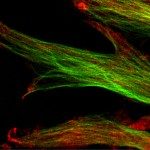Lien vers Pubmed [PMID] – 37713445
Lien DOI – 10.1371/journal.pone.0291736
PLoS One 2023 ; 18(9): e0291736
In many Gram-negative bacteria, the stress sigma factor of RNA polymerase, σS/RpoS, remodels global gene expression to reshape the physiology of stationary phase cells and ensure their survival under non-optimal growth conditions. In the foodborne pathogen Salmonella enterica serovar Typhimurium, σS is also required for biofilm formation and virulence. We have recently shown that a ΔrpoS mutation decreases the magnesium content and expression level of the housekeeping Mg2+-transporter CorA in stationary phase Salmonella. The other two Mg2+-transporters of Salmonella are encoded by the PhoP-activated mgtA and mgtB genes and are expressed under magnesium starvation. The σS control of corA prompted us to evaluate the impact of CorA in stationary phase Salmonella cells, by using global and analytical proteomic analyses and physiological assays. The ΔcorA mutation conferred a competitive disadvantage to exit from stationary phase, and slightly impaired motility, but had no effect on total and free cellular magnesium contents. In contrast to the wild-type strain, the ΔcorA mutant produced MgtA, but not MgtB, in the presence of high extracellular magnesium concentration. Under these conditions, MgtA production in the ΔcorA mutant did not require PhoP. Consistently, a ΔmgtA, but not a ΔphoP, mutation slightly reduced the magnesium content of the ΔcorA mutant. Synthetic phenotypes were observed when the ΔphoP and ΔcorA mutations were combined, including a strong reduction in growth and motility, independently of the extracellular magnesium concentration. The abundance of several proteins involved in flagella formation, chemotaxis and secretion was lowered by the ΔcorA and ΔphoP mutations in combination, but not alone. These findings unravel the importance of PhoP-dependent functions in the absence of CorA when magnesium is sufficient. Altogether, our data pinpoint a regulatory network, where the absence of CorA is sensed by the cell and compensated by MgtA and PhoP- dependent mechanisms.

